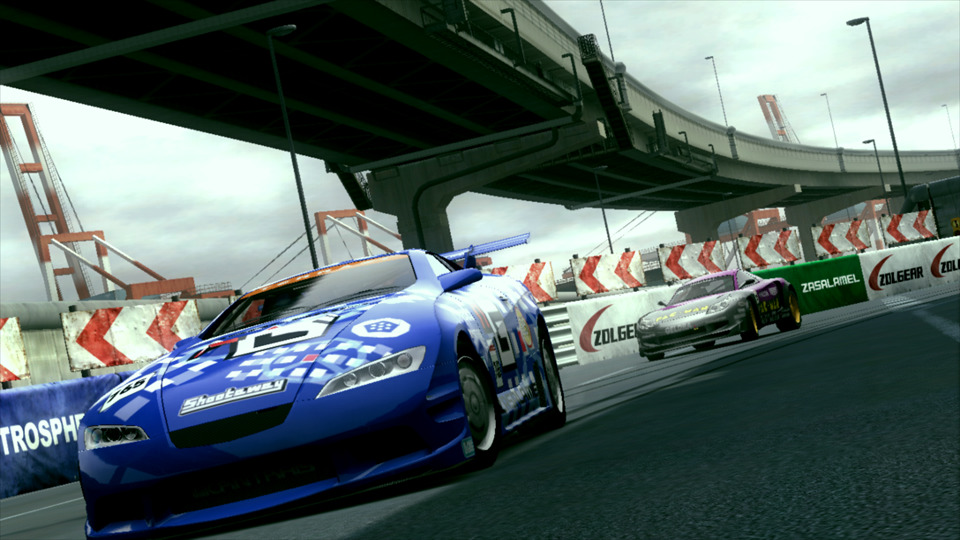This episode features a talk with Technical Director Keita Noto. During his lengthy talk with us, he shared his thoughts on the importance of accumulating a broad range of experience and his advice for anyone who aspires to create games.

Affiliation: Studio 2, Group 2, Production 3
―――Could you briefly tell us about your department and what you do for work?
I work as a technical director in the Programming Section of Studio 2, Group 2’s Production 3.
I joined Namco (as it was known back then) as an experienced hire in 2005. I received the opportunity thanks to one of my acquaintances, Masaya Kobayashi, whom I met in the company I worked in after graduation and who is now one of Bandai Namco Studios’ board members.
After the first company I worked in closed, I joined another where I developed a racing game. I met up with Masaya Kobayashi for the first time in a while around that time, and he asked me if I would join the company he works at, since they were developing a racing game and were short on staff. That was my opportunity to join what was then Namco as a member of the Ridge Racer development team.
When I started at the job, I worked at the Naka-meguro office in front of Naka-meguro Station, not the Yokohama Creative Center near Kanagawa-shimmachi.
I gained experience as an engineer on several projects including Ridge Racer, We Ski, and Go Vacation. I currently work as a technical director and I oversee other engineers on several projects.
―――You’re involved with so many different titles! Do you tend to work on racing and sports games?
I’m not more partial to racing or sports games than others. Maybe I tend to get assigned to development teams that work on these types of titles because I developed racing games in my previous job (laughs).
Looking back at all the work I’ve done since I joined Namco until now, I realize I’ve tried my hand at a lot of different jobs, including UI programmer, sequence control programmer, and network engineer. I don’t think I have the upper hand in terms of knowledge or technical prowess over an engineer who spent their entire career specializing in a specific technology. Instead, I think my strength is the depth of knowledge I gained from a wide variety of experiences. And I often feel that this experience helps me when I’m required as technical director to supervise engineers who are involved with all sorts of tasks.
―――What does a technical director do?
A technical director is comparable to a section manager in a typical company.
Simply put, it’s a management position that helps carry out projects by supervising and directing programmers. Specifically, our work involves determining specifications and policies related to programming, acting as liaisons between other internal departments and external companies, and giving advice as a technical correspondent. You need to be able to examine projects from a bird’s-eye-view and use that information to determine technology-related policies.
I’m currently involved with several internal projects; my work often consists of proposing new plans and drafting development schedules. Another important aspect of this job is giving input from an engineer’s perspective on plans devised by producers and directors and deciding what kind of technical approach we should take to accomplish them.

RIDGE RACER™7 & ©Bandai Namco Entertainment Inc.
―――What made you decide to become an engineer?
I was interested in writing programs, of course, but I became a programmer because I aspired to create games.
There aren’t many people who aspire to join the gaming industry with dreams of becoming a producer or director in the future. However, if you want to do work related to games, I think that becoming a programmer and joining the industry like I did is a good option.
You need a certain type of talent to become a sound creator or visual artist, and not everyone is disposed to that type of work. On the other hand, programming is a relatively accessible job path as long as you’re not opposed to learning about tech.
And there’s a plethora of positions that fall under the category of game engineer. For example, test engineers work to maintain or raise the quality of a title through testing (or game debugging) and report the bugs that they find to the appropriate engineer for revision. Another aspect of their job is making testing more efficient, so this is a good fit for anyone who constantly thinks up ways to improve or streamline tasks.
Or you might find it engaging to work as a server engineer. Many recent titles offer cross-platform support, and in this position, you develop systems to make games run smoothly on any console or better technology for online play. You could pursue your interests and areas of expertise and aim to become highly specialized or create a career like my own, where you gain a variety of competencies by experiencing many different types of work.
By the way, engineers’ names are currently made public less often than those of producers or artists. But I think engineers take pride in the fact that they’re the ones that make the games run (laughs). It’s our job to take the materials created by other teams and implement them so they run in-game. No position is more important than another, but I don’t want anyone to forget about the engineers who implement the game.
―――What’s a trait you only find in game engineers?
That in their job there’re no correct answers, and it’s OK to lie a little bit here and there (laughs).
I might be misunderstood if I phrase things that way. What I mean to say is, banks can’t afford their calculations to be off by a single yen, and errors in systems in the medical industry or basic infrastructure could affect peoples’ livelihoods or even turn into a matter of life or death; in any of these cases being error-free is a must. However, in games, even if the physics calculations for objects differ slightly from the real world, they’re OK if they make the game more fun to play.
The goal is to have our players enjoy playing our games even more, so you don’t necessarily have to mimic reality all of the time. That being said, bugs that affect gameplay are never acceptable.
And because there are no absolutely correct answers, you have more room to think about how to implement things on your own.
―――Do you have any anecdotes from your job about experiences that left an impression on you?
This is back when I worked as a programmer, but I often ended up in situations where deadlines were pressing, specifications weren’t decided, or I wasn’t making any progress with my work.
Programmers write programs following pre-decided specifications, so it’s less than encouraging when your deadline is fixed but the process before your own is delayed. However, I think it’s useless to fixate on the past, so I try to think that things will just turn out the way they turn out. And when my turn comes around, I try to add in everything that’s decided by the deadline as quickly as possible, while also working flexibly and being considerate of the processes that come before and after my own.
―――If you had to name a single thing you’re confident in, what would it be?
Whenever I feel that something isn’t proceeding smoothly in one of my projects, I try to jump in to help right away. I think it’s not enough to only do the work you’re in charge of; I try to intervene as much as possible whenever I feel there’s something I can do to improve the final game. I strongly feel that I should give my best to make the game as good as it can be, even if doing so means making my own work tougher.
I felt that I was lacking in specific tech that I could call my forte, so I decided to take the opposite approach by experiencing lots of different things and becoming more technically versatile. When I was a programmer, I made sure to proactively join projects that were short on staff.
――― What are your aspirations, or are there any challenges you want to take on in the future?
That would be learning about something new that I haven’t tried before.
I’m not the type of person that tries to learn about new technology ahead of everyone else, but I do try to learn about things that catch my eye even if it’s after-the-fact. I try to keep my input as varied as possibly by reading articles on the internet, after which I dig deeper into the parts that pique my interest. I also learn about tech trends in the game development industry by watching presentations given each year at CEDEC.
I’m currently interested in cloud-related technology and am in the middle of studying all sorts of topics that I thought might help in my work.

――― Do you have a guiding principle?
I wouldn’t call it a guiding principle, but I make a point of taking on hard work as often as possible. I’m sure everyone can relate to having to do something really hard. I find that when I look back on those times after some time has passed, all the tough memories turn into something great.
It’s because of these experiences that I advise staff that work under me to spare no effort while they’re young. You should jump at all sorts of opportunities and not just do the work that is given to you. The difficulties you face will add to your experience and build you up to reach your next level. It’s important to push to your limit every so often; it’s with that in mind that I try to continuously to take on all sorts of new, challenging tasks.
―――Thank you!




